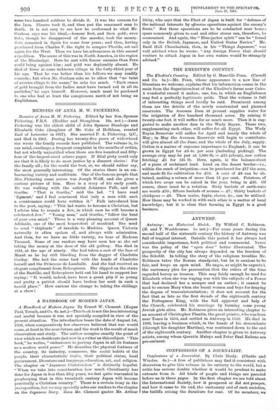Antwerp : an Historical Sketch. By Wilfrid C. Robinson. (R.
and T. Washbourne. 5s. net.)—For some years during the second half of the sixteenth century the history of Antwerp was full of tragical interest. Outside this period it has always had considerable importance, both political and commercial. Never was the policy of the "open door" better illustrated. The prosperity of the city has always depended on the freedom of the Scheldt. In telling the story of the religions troubles Mr. Robinson takes the Roman standpoint, but he is anxious to be fair, and keeps an open mind. He urges, as might be expected, the customary plea for persecution that the rulers of the time regarded heresy as treason. This may fairly enough be used for Elizabeth when she was waging war with the subjects of a Power that had declared her a usurper and an outlaw ; it cannot be used to excuse Mary when she burnt women and boys for denying the dogma of transubstantiation; it does not account for the fact that as late as the first decade of the eighteenth century the Portuguese King, with the full approval and help of the Church, celebrated his marriage by burning some young Jewish girls alive. Mr. Robinson gives an interesting chapter to an account of Christopher Plantin, the great printer, who was born near Tours in 1514, and settled in Antwerp in 1549. He died in 1589, leaving a business which, in the hands of his descendants (through his daughter Martina), was continued down to the end of the eighteenth century. Another chapter is given to Antwerp artists, among whom Quentin Matsys and Peter Paul Rubens are pre-eminent.
CONFESSIONS OF A JOURNALIST.


























































 Previous page
Previous page